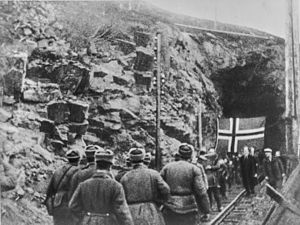Liberation of Finnmark
| Liberation of Finnmark | |||||||
|---|---|---|---|---|---|---|---|
| Part of World War II | |||||||
 Soviets meet Norwegians sheltering in a mine in Finnmark |
|||||||
|
|||||||
| Belligerents | |||||||
|
|
|
||||||
| Commanders and leaders | |||||||
|
|
|
||||||
| Strength | |||||||
|
Soviet Union: 14th Army Northern Fleet Norway: 3,000+ soldiers & police troops 1,500+ militia 2 corvettes 3 minesweepers Various auxiliary vessels United Kingdom: Home Fleet |
|||||||
| Casualties and losses | |||||||
|
Soviet Union: 6,084 killed or missing 15,149 wounded Norway: 10 killed 14 captured 1 corvette sunk 6 fishing vessels destroyed |
Unknown | ||||||
| Over 300 civilians died while evacuating Finnmark | |||||||
Allied victory
![]() Soviet Union
Soviet Union![]() Norway
Norway
Naval support:![]() United Kingdom
United Kingdom
The liberation of Finnmark was a military operation, lasting from 23 October 1944 until 26 April 1945, in which Soviet and Norwegian forces wrestled away control of Finnmark, the northernmost county of Norway, from Germany. It started with a major Soviet offensive that liberated Kirkenes.
After the Moscow Armistice between the Soviet Union and Finland on 4 September 1944, the Petsamo region, still largely occupied by the Germans, was ceded to the Soviet Union, and the Finnish government agreed to remove the remaining German forces from their own territory by 15 September (leading to the Lapland War). During the retreat of the German 20th Mountain Army, called Operation Birke, the decision was made by the German Armed Forces Command to withdraw completely from northern Norway and Finland in Operation Nordlicht. While the Germans prepared for this operation, the Soviets decided to seize the offensive initiative on the Karelian Front.
...
Wikipedia
